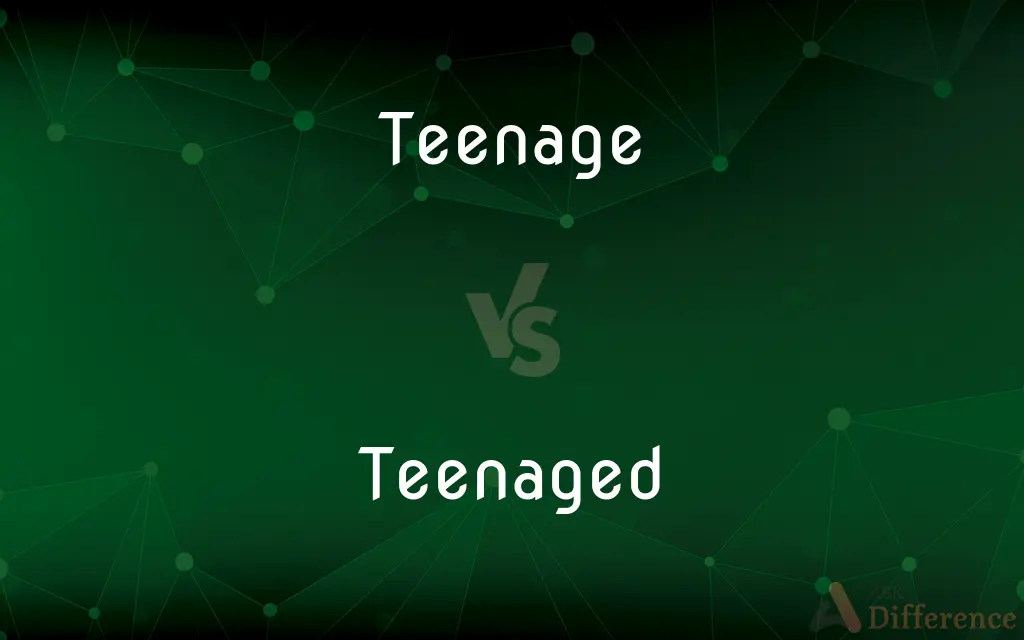Teenage vs. Teenaged — What's the Difference?
Edited by Tayyaba Rehman — By Maham Liaqat — Updated on March 7, 2024
"Teenage" describes the years and characteristics of someone 13-19 years old, focusing on age-related aspects. "Teenaged" is an adjective specifically modifying nouns to indicate something or someone is of teenage years.

Difference Between Teenage and Teenaged
Table of Contents
ADVERTISEMENT
Key Differences
"Teenage" is commonly used as an adjective to describe anything related to the period of being 13 to 19 years old, emphasizing the broader aspects of this life stage, such as teenage behavior, attitudes, and culture. On the other hand, "teenaged" is an adjective that directly modifies nouns, particularly to describe individuals in their teenage years, highlighting their current age status.
While "teenage" is versatile, often used in general contexts to talk about youth culture, issues, or demographics, "teenaged" focuses more narrowly on age as a defining characteristic. For example, "teenage trends" refers to the broader phenomena within youth culture, whereas "teenaged students" refers specifically to students who are within the teenage age range.
The usage of "teenage" is more common in everyday language, seen in phrases like "teenage years" or "teenage problems," where the emphasis is on the general experience of adolescence. "Teenaged," while grammatically correct, is less frequently used and tends to appear in more formal or written contexts, emphasizing the age of the person or entity being described.
"Teenage" can also precede nouns to describe entities associated with teenagers, such as "teenage music" or "teenage fashion," suggesting these are interests or styles predominantly of teenagers. "Teenaged," by contrast, is used less often in such broad cultural references, maintaining a closer link to the literal age group, as in "teenaged protagonist" in literature, which specifies the protagonist's age.
In terms of linguistic preference, "teenage" is preferred for its brevity and familiarity in colloquial speech and writing. "Teenaged," though accurate, might be chosen for clarity in contexts where the age-specific qualification of a noun is necessary or to avoid ambiguity.
ADVERTISEMENT
Comparison Chart
Usage
Adjective describing age-related characteristics or periods.
Adjective directly modifying nouns to indicate age.
Context
Broad, relating to general aspects of being 13-19 years old.
Specific, highlighting age as a defining characteristic.
Commonality
More commonly used in everyday language.
Less common, more formal or specific.
Examples
Teenage culture, teenage years.
Teenaged students, teenaged athlete.
Preference
Preferred for general references to adolescence.
Used for clarity in age-specific references.
Compare with Definitions
Teenage
Relating to the age group from 13 to 19 years old.
The teenage audience was captivated by the new superhero movie.
Teenaged
Specifically denotes something or someone as being of teenage years.
The park was filled with teenaged skateboarders.
Teenage
Describes phenomena or attributes common among teenagers.
Teenage rebellion is a phase many parents anticipate.
Teenaged
Highlights the age of subjects in formal or written contexts.
Teenaged learners often face unique educational challenges.
Teenage
Reflects the lifestyle or issues faced by teenagers.
Teenage angst is a theme explored in many novels.
Teenaged
Indicates the literal age group of individuals in descriptions.
Teenaged actors bring authenticity to high school roles in films.
Teenage
Used to denote items or concepts popular with teenagers.
Teenage fashion often dictates the school's clothing trends.
Teenaged
Used to qualify individuals with a precise age reference.
The competition was won by a teenaged prodigy.
Teenage
Concerned with the experiences during teenage years.
Teenage friendships can have a lasting impact on one's social development.
Teenaged
Applied to denote the specific age-related status of persons.
The novel features a teenaged heroine navigating life's complexities.
Teenage
Denoting a person between 13 and 19 years old
A teenage girl
Teenaged
Between 13 and 19 years old
Crowds of screaming teenaged girls
Teenage
Of, relating to, or applicable to those aged 13 through 19.
Teenaged
Of, relating to, or applicable to those aged 13 through 19.
Teenage
Of or relating to an age between thirteen and nineteen years old.
Fred's teenage years were the most difficult of times.
Teenaged
Aged between thirteen and nineteen inclusive; teenage
A teenaged girl
Teenage
Brushwood for fences and hedges.
Teenaged
Being of the age 13 through 19;
Teenage mothers
The teen years
Teenage
The longer wood for making or mending fences.
Teenage
Of or pertaining to a teenager; being in one's teens; as, a busload of teenage football fans; teenage inexperience.
Teenage
Being of the age 13 through 19;
Teenage mothers
The teen years
Common Curiosities
Is "teenaged" more formal than "teenage"?
Yes, "teenaged" tends to appear in more formal contexts or written English, focusing specifically on age.
Can "teenage" describe both people and things?
Yes, "teenage" can describe both people (e.g., teenage boys) and things or concepts related to teenagers (e.g., teenage culture).
How do these terms affect the perception of adolescence?
"Teenage" encompasses a broad understanding of adolescence, while "teenaged" focuses on the specific age, potentially influencing how adolescence is perceived in different contexts.
Which is more commonly used, "teenage" or "teenaged"?
"Teenage" is more commonly used in both spoken and written English due to its broad applicability and familiarity.
Is one more correct than the other?
Neither is more correct; usage depends on context and preference for specificity or formality.
Can "teenaged" be used interchangeably with "teenage"?
While they can sometimes be used interchangeably, "teenaged" is more specific to indicating the age of individuals, whereas "teenage" broadly refers to anything related to that life stage.
Why would someone choose "teenaged" over "teenage"?
Someone might choose "teenaged" for clarity in contexts where specifying the age of the person is necessary or to emphasize the aspect of age more precisely.
What is the difference between "teenage" and "teenaged"?
"Teenage" is an adjective for things related to the age group 13-19, while "teenaged" specifically modifies nouns to indicate someone is of that age group.
Do "teenage" and "teenaged" have the same grammatical role?
Both are adjectives, but "teenage" is used more broadly, while "teenaged" directly modifies a noun to indicate age.
Can "teenage" and "teenaged" be used in professional writing?
Yes, both can be used in professional writing, with "teenaged" offering precision in age-specific references and "teenage" suitable for general discussions of adolescence.
Share Your Discovery

Previous Comparison
Epitome vs. Epiphany
Next Comparison
Allegation vs. AccusationAuthor Spotlight
Written by
Maham LiaqatEdited by
Tayyaba RehmanTayyaba Rehman is a distinguished writer, currently serving as a primary contributor to askdifference.com. As a researcher in semantics and etymology, Tayyaba's passion for the complexity of languages and their distinctions has found a perfect home on the platform. Tayyaba delves into the intricacies of language, distinguishing between commonly confused words and phrases, thereby providing clarity for readers worldwide.














































